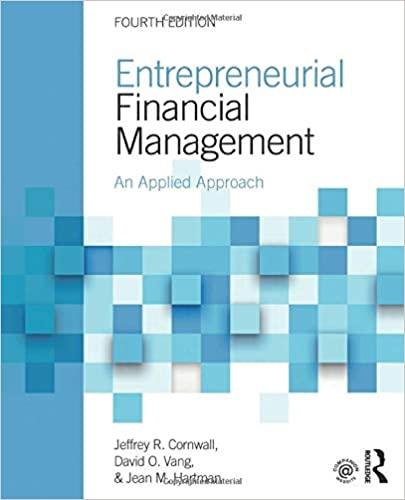While James Craig and his former classmate Paul Dolittle both studied accounting at school, they ended up pursuing careers in professional cake decorating. Their



While James Craig and his former classmate Paul Dolittle both studied accounting at school, they ended up pursuing careers in professional cake decorating. Their company, Good to Eat (GTE), specializes in custom-sculpted cakes for weddings, birthdays, and other celebrations. James and Paul formed the business at the beginning of 2018, and each contributed $50,000 in exchange for a 50 percent ownership interest. GTE also borrowed $200,000 from a local bank. Both James and Paul had to personally guarantee the loan. Both owners provide significant services for the business. The following information pertains to GTE's 2018 activities: GTE uses the cash method of accounting (for both book and tax purposes) and reports income on a calendar-year basis. GTE received $450,000 of sales revenue and reported $210,000 of cost of goods sold (it did not have any ending inventory). GTE paid $30,000 compensation to James, $30,000 compensation to Paul, and $40,000 of compensation to other employees (assume these amounts include applicable payroll taxes if any). GTE paid $15,000 of rent for a building and equipment, $20,000 for advertising, $14,000 in interest expense, $4,000 for utilities, and $2,000 for supplies. GTE contributed $5,000 to charity. GTE received a $1,000 qualified dividend from a great stock investment (it owned 2 percent of the corporation distributing the dividend), and it recognized $1,500 in short-term capital gain when it sold some of the stock. . On December 1, 2018, GTE distributed $20,000 to James and $20,000 to Paul. . GTE has qualified property of $300,000 (unadjusted basis). (Leave no answer blank. Enter zero if applicable. Enter N/A if not applicable.) a-1. Assume James and Paul formed GTE as an S corporation. Complete GTE's Form 1120S, page 1; Form 1120 S, Schedule K. Download the Tax Form and enter the required values in the appropriate fields. Please right click on the attached Adobe document and select open in new window. Then, download the Tax Form and enter the required values in the appropriate fields. Save your completed Tax Form to your computer and then upload it here by clicking "Browse." Next, click "Save." While James Craig and his former classmate Paul Dolittle both studied accounting at school, they ended up pursuing careers in professional cake decorating. Their company, Good to Eat (GTE), specializes in custom-sculpted cakes for weddings, birthdays, and other celebrations. James and Paul formed the business at the beginning of 2018, and each contributed $50,000 in exchange for a 50 percent ownership interest. GTE also borrowed $200,000 from a local bank. Both James and Paul had to personally guarantee the loan. Both owners provide significant services for the business. The following information pertains to GTE's 2018 activities: GTE uses the cash method of accounting (for both book and tax purposes) and reports income on a calendar-year basis. . . GTE received $450,000 of sales revenue and reported $210,000 of cost of goods sold (it did not have any ending inventory). GTE paid $30,000 compensation to James, $30,000 compensation to Paul, and $40,000 of compensation to other employees (assume these amounts include applicable payroll taxes if any). GTE paid $15,000 of rent for a building and equipment, $20,000 for advertising, $14,000 in interest expense, $4,000 for utilities, and $2,000 for supplies. GTE contributed $5,000 to charity. GTE received a $1,000 qualified dividend from a great stock investment (it owned 2 percent of the corporation distributing the dividend), and it recognized $1,500 in short-term capital gain when it sold some of the stock. . On December 1, 2018, GTE distributed $20,000 to James and $20,000 to Paul. GTE has qualified property of $300,000 (unadjusted basis). (Leave no answer blank. Enter zero if applicable. Enter N/A if not applicable.) a-2. Assume James and Paul formed GTE as an S corporation. Complete Paul's Form 1120S Schedule K-1. Download the Tax Form and enter the required values in the appropriate fields. Please right click on the attached Adobe document and select open in new window. Then, download the Tax Form and enter the required values in the appropriate fields. Save your completed Tax Form to your computer and then upload it here by clicking "Browse." Next, click "Save." distributing the dividend), and it recognized $1,500 in short-term capital gain when it sold some of the stock. On December 1, 2018, GTE distributed $20,000 to James and $20,000 to Paul. GTE has qualified property of $300,000 (unadjusted basis). (Leave no answer blank. Enter zero if applicable. Enter N/A if not applicable.) a-3. Assume James and Paul formed GTE as an S corporation. i. Compute the tax basis of Paul's stock in GTE at the end of 2018. ii. What amount of Paul's income from GTE is subject to FICA or self-employment taxes. iii. What amount of income, including its character, will Paul recognize on the $20,000 distribution he receives on December 1? iv. What amount of tax does GTE pay on the $1,000 qualified dividend it received? i. End of Year Stock Basis ii. Paul's income iv. Tax
Step by Step Solution
There are 3 Steps involved in it
Step: 1
To understand the tax considerations for the S Corporation Good to Eat GTE and calculate the necessary figures we need to derive several financial details from the given information Heres a stepbystep ...
See step-by-step solutions with expert insights and AI powered tools for academic success
Step: 2

Step: 3

Ace Your Homework with AI
Get the answers you need in no time with our AI-driven, step-by-step assistance
Get Started


